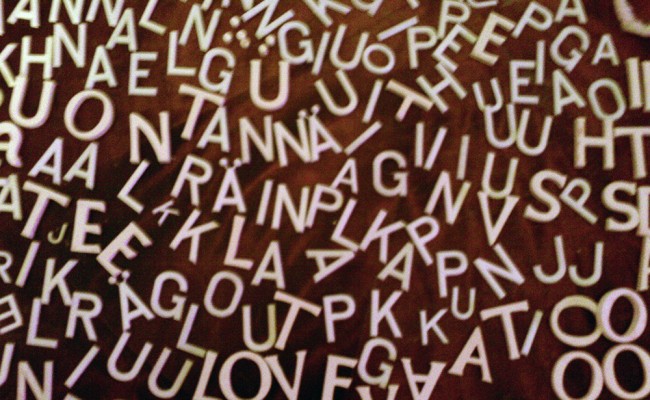To write for publication, even casually, is to absorb a specific new set of words and phrases: a kind of specialised jargon.
Writing about writing is an increasingly large genre of its own, one which includes important discussions about paying the writers. I’ve little to add to these debates, or to what’s already out there documenting the rush of panic that greets a commission, the process of typing, deleting, and retyping, and the increasingly neurotic emails to editors. If you’ve a few minutes to spare, though, there are worse ways to spend them than considering the writing lexicon.
It all starts with a pitch – something the would-be writer throws out, hopefully, to an editor. This can be read as a sporting metaphor, but ‘pitch’ is also used for sound: writers aim for perfect pitch, a siren’s song to lure in editors, and ultimately readers. Getting that precise note can be difficult; in an interview, Meanjin editor Zora Sanders observed: ‘A strong pitch is polite but not self-deprecating’, expressing a hope that, in particular, ‘women who pitch and submit to me will stop denigrating themselves and their own work.’
When writing commentary, a pitch needs to contain details of what the hook will be – what it will use to grab the reader’s attention. This term, suggestive of fishing, expresses the need to attach an article to current events so it doesn’t float adrift. To hook someone in is, of course, to manipulate them’ in a thought-provoking piece on storytelling, Maria Tumarkin noted: ‘Starting an essay or any substantial piece of journalism with a story is pretty much the law these days. The reader will swallow your story and then here she is with your shiny hook in her innards and you can start pulling on it this way or that.’
Assuming your hook is sufficiently shiny to grab the editor’s attention, a vocabulary of negotiation comes into play: if it’s a little too blunt or crooked, there’s the delicate matter of rejection. This area is ripe with figurative language. Writer and editor will speak of making a piece of work sharper, stronger, of pulling it into shape and making it fit with a publication’s style. A writer might withdraw a piece, but work which is commissioned but then rejected is pulled, or, more dramatically spiked – a term summoning an image of a butterfly impaled on a pin.
When the writing is done, submitted and published, there’s the small matter of what to call it. Traditionally, the answer might have been an essay, but terminology is changing. In his introduction to a 2008 edition of The Best American Essays, Adam Gopnik wrote:
The essay is a living genre, in the simple sense that people write them for money when they are not being at all ‘literary’. Science essays, food essays, parenting essays – editors who wear hazmat suits to deal with the crush of short stories coming through the transom still commission essays, although they often don’t call them that. The essays of our time, taking them in the wide role of what writers actually call ‘pieces’ (as in ‘Can you give us a piece on…’) to distinguish them from straight reviews, are as likely to hang on and make history as any novel or play or poem, maybe more.
In recent years, ‘essay’ has increasingly been prefaced by ‘personal’, such that the term is almost inextricably associated with writing narrating the self. The growing dominance of personal writing is the subject of lively debate, into which I’ve stuck my oar a couple of times, writing that in ‘an increasingly atomised world, it is important … to stretch past the confines of individualism, looking outwards as well as in’. There is a risk of being too glibly harsh in this context, though; as Jason Wilson noted recently, ‘our bonds to political causes … can be strengthened by personal accounts that help us understand the lived texture of systemic wrongs’.
Personal or otherwise, essay is a term which bears the weight of tradition, connoting a quality of gravitas. Piece is shorter, safer, and makes fewer claims: it’s something incomplete, a part of a larger whole.
Of quite a different nature is the derisive term thinkpiece. David Haglund notes in Slate that this word mash-up has become ‘the go-to term’ if ‘you want to mock a piece of writing’. Haglund concludes that ‘just as the Internet has made it easier to publish think-pieces, it has made it much easier to publish jokes about them, too’. Even a thinkpiece is better than a hot take, sarcastic shorthand for attention-grabbing, kneejerk opinion articles. The term conveys an image of writers frantically muscling in on an event, eager to stamp their own unique, provocative slant on it before someone else beats them to it: ‘hands off, this is my take!’
The realm of online critique and mockery takes us to the influence of performance. In Overland, Mel Campbell has noted that ‘[a]wkward shame is the normative mode of writerly self-promotion’. Campbell observed that ‘like most other writers of my acquaintance, I find online self-promotion shameful … I try to avoid both boasting and the even more obnoxious humblebragging’. One way to draw attention to work while seeking to remain on the right side of wankerdom is to eschew talk of essays or pieces and, with a forced casualness, simply to speak of things: ‘So, I wrote a thing’. This tendency amply demonstrates the awkwardness Campbell describes, and courts the humblebrag by cloaking pride in an ill-fitting garb of offhandedness. Striking the right note of matter-of-factness, self-deprecation and self-promotion is, clearly, an elusive skill.
So, too, is knowing when and how to end a piece; perhaps we need an equivalent to hook for conclusions, denoting an elusive quality that will gently detach an article from its reader. A thud, perhaps? Anyway. That’s it.






